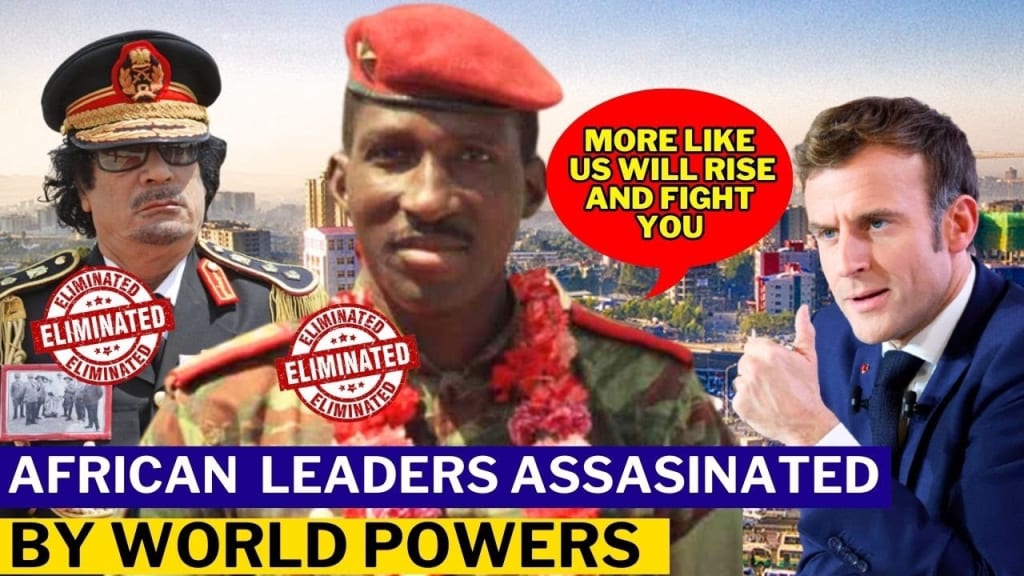Twelve Distinguished African Presidents Whose Lives Were Cut Short by Western Powers
top 12 African presidents who were assassinated, directly or indirectly, by Western powers

The annals of African political leadership are marked by the weighty burdens that fell upon both the rulers and the ruled, both before and after independence. Two critical challenges that every African leader must confront are the high and often unyielding demands of their citizens and the significant pressure exerted by neocolonialist Western powers. It is an irrefutable fact that a notable number of African presidents have been removed from power through coups d'état, and a considerable number have been assassinated. This article aims to shed light on the top 12 African presidents who were assassinated, directly or indirectly, by Western powers due to their opposition to imperialism or neocolonialism. Some of these leaders may have contributed to their own demise through their actions.
Muammar Gaddafi (1942-2011):
Gaddafi, also known as Colonel Gaddafi, ruled Libya from 1969 to 2011. He championed Arab nationalism and socialism, advocating for African unity. His anti-neocolonialist stance and push for African unity earned him the enmity of Western leaders. Gaddafi played a pivotal role in transforming the Organization of African Unity (OAU) into the African Union (AU). His rule came to an end during the 2011 NATO-backed uprising in Libya.
Thomas Sankara (1949-1987):
Sankara, often called the Che Guevara of Africa, served as the President of Burkina Faso from 1983 until his assassination in 1987. He implemented revolutionary economic policies and initiated significant social changes, including renaming the country from Upper Volta to Burkina Faso, meaning "Land of the Incorruptible People." Sankara's commitment to education and land redistribution made him a threat to both Western powers and local elites. He was assassinated in a coup.
Samuel Kanyon Doe (1951-1990):
Doe was the President of Liberia from 1980 to 1990. His rise to power began with a coup in 1980 when he overthrew President William R. Tolbert. Doe's regime was marked by political repression and economic decay. He faced significant opposition and was eventually assassinated in 1990 during the First Liberian Civil War.
Anwar Sadat (1918-1981):
Sadat served as Egypt's President from 1970 to 1981. He is remembered for signing the Camp David Accords with Israel in 1978, which led to the Egypt-Israel Peace Treaty in 1979. His pursuit of peace with Israel led to Egypt's isolation within the Arab world. Sadat was assassinated during a military parade in Cairo in 1981 by extremists opposed to his peace efforts.
Patrice Lumumba (1925-1961):
Lumumba was the first Prime Minister of the Democratic Republic of Congo in 1960. He fiercely opposed Belgian colonialism and imperialism and resisted efforts to install puppet leaders before independence. Lumumba's resistance led to his capture, torture, and eventual assassination in 1961, with alleged involvement from Belgian and U.S. authorities.
Marien Ngouabi (1938-1977):
Ngouabi was the President of the People's Republic of the Congo (Brazzaville) from 1969 until his assassination in 1977. His leadership saw a shift towards Marxism and centralization of power. Ngouabi's tribalistic policies created opposition, and he was assassinated in a coup in 1977.
Juvenal Habyarimana (1937-1994) and Cyprien Ntaryamira (1955-1994):
Habyarimana was the President of Rwanda, and Ntaryamira was the President of Burundi. Their deaths in the 1994 plane crash triggered the Rwandan genocide, with differing accounts of who was responsible, including Hutu extremists and Tutsi fighters.
Muhammadu Buhari (1938-1976):
Buhari served as the head of state and commander-in-chief of the armed forces in Nigeria. He was assassinated in an attempted coup in Lagos in 1976, led by Lieutenant Colonel Buka Suka Dimka.
João Bernardo Vieira (1939-2009):
Vieira was the President of Guinea-Bissau from 1980 to 1999 and then again from 2005 until his assassination in 2009. His political career was marked by coups, civil wars, and regional conflicts. He was assassinated by unknown soldiers in 2009.
Ibrahim Baré Maïnassara (1949-1999):
Maïnassara was a military officer and diplomat who ruled Niger until his assassination during a military coup in April 1999.
Mohamed Boudiaf (1919-1992):
Boudiaf was an Algerian politician who served as the President of Algeria briefly in 1992. He was assassinated while giving a speech in Algiers.
William Richard Tolbert Jr. (1913-1980):
Tolbert was the President of Liberia from 1971 until his assassination in 1980 during a coup led by Samuel Doe.
These African leaders, who stood against neocolonialism, imperialism, and corruption, faced significant opposition from both internal and external forces. Their assassinations remain contentious, and they continue to influence the political landscape of Africa.
About the Creator
Francis Osei
“Tom bele has been working with writing challenged clients for over four years. He provides ghost writing, coaching and ghost editing services.






Comments (1)
Nice work! Don’t tell mom about the baby sitter! Great job 💚💜♥️💙❤️